
Entertainment
-
 DiscoverEU marks 40 years of Schengen with 40,000 free travel passes for young Europeans
The European Commission is celebrating the 40th anniversary of the Schengen Area by offering 40,000 young Europeans the chance to explore the continent through DiscoverEU, part of the31 October 2025Read More...
DiscoverEU marks 40 years of Schengen with 40,000 free travel passes for young Europeans
The European Commission is celebrating the 40th anniversary of the Schengen Area by offering 40,000 young Europeans the chance to explore the continent through DiscoverEU, part of the31 October 2025Read More... -
 Brussels universities to award honorary doctorates to Stromae, Lize Spit, and Amélie Nothomb
The Vrije Universiteit Brussel (VUB) announced on Monday that Stromae, Lize Spit, Amélie Nothomb, François Schuiten, and Ever Meulen will receive joint honorary doctorates from VUB and27 October 2025Read More...
Brussels universities to award honorary doctorates to Stromae, Lize Spit, and Amélie Nothomb
The Vrije Universiteit Brussel (VUB) announced on Monday that Stromae, Lize Spit, Amélie Nothomb, François Schuiten, and Ever Meulen will receive joint honorary doctorates from VUB and27 October 2025Read More... -
 Stolen Renaissance masterpiece returns to Italy after 52 years
After more than half a century, a stolen Renaissance painting has finally returned home to Italy. *Madonna with Child*, a tempera-on-wood masterpiece by Venetian painter Antonio Solario,31 July 2025Read More...
Stolen Renaissance masterpiece returns to Italy after 52 years
After more than half a century, a stolen Renaissance painting has finally returned home to Italy. *Madonna with Child*, a tempera-on-wood masterpiece by Venetian painter Antonio Solario,31 July 2025Read More... -
 Belgian seaside resorts: highlights of royal De Panne
While Ostend is often dubbed the queen of Belgium’s seaside resorts, the country’s coastline offers many other gems worth discovering. In this series, Belga English explores four distinctive20 July 2025Read More...
Belgian seaside resorts: highlights of royal De Panne
While Ostend is often dubbed the queen of Belgium’s seaside resorts, the country’s coastline offers many other gems worth discovering. In this series, Belga English explores four distinctive20 July 2025Read More... -
 Louis Vuitton named suspect in Dutch money laundering probe
Luxury fashion house Louis Vuitton has been named a suspect in a Dutch money laundering investigation, according to the Dutch Public Prosecution Service (OM). The OM alleges that18 July 2025Read More...
Louis Vuitton named suspect in Dutch money laundering probe
Luxury fashion house Louis Vuitton has been named a suspect in a Dutch money laundering investigation, according to the Dutch Public Prosecution Service (OM). The OM alleges that18 July 2025Read More... -
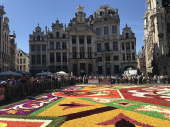 Brussels tops global rankings for international meetings as tourism soars to new heights
Brussels has once again secured its position as the world’s top city for international meetings, according to the latest annual report from the Union of International Associations (UIA).26 June 2025Read More...
Brussels tops global rankings for international meetings as tourism soars to new heights
Brussels has once again secured its position as the world’s top city for international meetings, according to the latest annual report from the Union of International Associations (UIA).26 June 2025Read More... -
 Coffee prices keep climbing in Czech establishments
The cost of a cup of coffee in Czech restaurants and cafés has increased by 4% over the past year, now averaging CZK 57.80, according to data from the Dotykačka point-of-sale system.15 June 2025Read More...
Coffee prices keep climbing in Czech establishments
The cost of a cup of coffee in Czech restaurants and cafés has increased by 4% over the past year, now averaging CZK 57.80, according to data from the Dotykačka point-of-sale system.15 June 2025Read More...
Politics
-
 MEPs push for a “military Schengen” to counter potential Russian threat
The European Parliament has thrown its support behind plans to create a “military Schengen” – a system that would allow troops and military equipment to move freely across EU borders.Read More...
MEPs push for a “military Schengen” to counter potential Russian threat
The European Parliament has thrown its support behind plans to create a “military Schengen” – a system that would allow troops and military equipment to move freely across EU borders.Read More... -
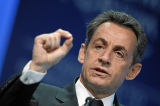 France’s former President Sarkozy to begin appeal trial over Libyan Funding allegations
Former French President Nicolas Sarkozy is set to appear in a Paris court on March 16 for the start of his appeal trial over allegations of illegal campaignRead More...
France’s former President Sarkozy to begin appeal trial over Libyan Funding allegations
Former French President Nicolas Sarkozy is set to appear in a Paris court on March 16 for the start of his appeal trial over allegations of illegal campaignRead More... -
 French parliament poised to halt Macron’s pension reform amid budget Turmoil
French lawmakers are expected to vote Wednesday to suspend President Emmanuel Macron’s controversial pension reform, as the government battles to push next year’s budget through aRead More...
French parliament poised to halt Macron’s pension reform amid budget Turmoil
French lawmakers are expected to vote Wednesday to suspend President Emmanuel Macron’s controversial pension reform, as the government battles to push next year’s budget through aRead More... -
 Ex-minister Ziobro rejects corruption allegations, labels case political
Former Polish justice minister Zbigniew Ziobro vowed on Saturday to pursue “legal and political” action after parliament voted to lift his immunity, clearing the way for prosecutors to bringRead More...
Ex-minister Ziobro rejects corruption allegations, labels case political
Former Polish justice minister Zbigniew Ziobro vowed on Saturday to pursue “legal and political” action after parliament voted to lift his immunity, clearing the way for prosecutors to bringRead More... -
 Pro-Russian hackers briefly disrupt Belgian Telecom websites in DDoS attack
A wave of DDoS attacks briefly disrupted the websites of Belgian telecom operators Proximus and Scarlet on Wednesday morning, with the pro-Russian hacker group NoName057 claimingRead More...
Pro-Russian hackers briefly disrupt Belgian Telecom websites in DDoS attack
A wave of DDoS attacks briefly disrupted the websites of Belgian telecom operators Proximus and Scarlet on Wednesday morning, with the pro-Russian hacker group NoName057 claimingRead More...
News
-
 EU must build over 2 million homes annually by 2035 to avert housing crisis, new data shows
The European Union will need to build more than two million new homes every year until 2035 to keep up with soaring demand, according to new projections released by the EuropeanRead More...
EU must build over 2 million homes annually by 2035 to avert housing crisis, new data shows
The European Union will need to build more than two million new homes every year until 2035 to keep up with soaring demand, according to new projections released by the EuropeanRead More... -
 Police raid homes and offices of French Culture Minister Rachida Dati in corruption probe
French police searched Culture Minister Rachida Dati’s home and offices on Thursday as part of a widening corruption investigation linked to her tenure as a European Parliament lawmaker,Read More...
Police raid homes and offices of French Culture Minister Rachida Dati in corruption probe
French police searched Culture Minister Rachida Dati’s home and offices on Thursday as part of a widening corruption investigation linked to her tenure as a European Parliament lawmaker,Read More... -
 White Christmas unlikely in Switzerland, MeteoSwiss says
The chances of a white Christmas in Switzerland are slim, with snowfall in the lowlands virtually ruled out, according to the Federal Office of Meteorology and Climatology (MeteoSwiss).Read More...
White Christmas unlikely in Switzerland, MeteoSwiss says
The chances of a white Christmas in Switzerland are slim, with snowfall in the lowlands virtually ruled out, according to the Federal Office of Meteorology and Climatology (MeteoSwiss).Read More... -
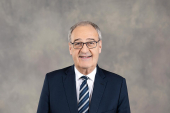 Guy Parmelin elected Swiss President for 2026 with record-breaking vote
Economics Minister Guy Parmelin will serve as President of the Swiss Confederation in 2026, securing the office with a result that sets a new benchmark for the current millennium.Read More...
Guy Parmelin elected Swiss President for 2026 with record-breaking vote
Economics Minister Guy Parmelin will serve as President of the Swiss Confederation in 2026, securing the office with a result that sets a new benchmark for the current millennium.Read More... -
 Nigeria seeks French support to tackle insecurity, Macron says
Nigerian President Bola Tinubu has requested increased support from France to combat escalating insecurity in the country’s north, French President Emmanuel Macron said on Sunday,Read More...
Nigeria seeks French support to tackle insecurity, Macron says
Nigerian President Bola Tinubu has requested increased support from France to combat escalating insecurity in the country’s north, French President Emmanuel Macron said on Sunday,Read More... -
 Swiss army has “gone back to sleep,” says departing chief
Switzerland briefly awakened to the urgency of national defence following Russia’s 2022 invasion of Ukraine — but has since drifted back into complacency, outgoingRead More...
Swiss army has “gone back to sleep,” says departing chief
Switzerland briefly awakened to the urgency of national defence following Russia’s 2022 invasion of Ukraine — but has since drifted back into complacency, outgoingRead More... -
 Poland and Germany to seal new defence pact in 2026, leaders announce
Polish Prime Minister Donald Tusk and German Chancellor Friedrich Merz said on Monday that their governments plan to sign a new bilateral defence agreement nextRead More...
Poland and Germany to seal new defence pact in 2026, leaders announce
Polish Prime Minister Donald Tusk and German Chancellor Friedrich Merz said on Monday that their governments plan to sign a new bilateral defence agreement nextRead More... -
 Monegasque Language Committee resumes its work
Following the publication of Sovereign Ordinance No. 11,219 on 7 May 2025, which appointed the members of the Monegasque Language Committee, the group has officially reconvened atRead More...
Monegasque Language Committee resumes its work
Following the publication of Sovereign Ordinance No. 11,219 on 7 May 2025, which appointed the members of the Monegasque Language Committee, the group has officially reconvened atRead More...

Most Read
- Teen held after US woman killed in London stabbings
- Football: Farhad Moshiri adamant Everton deal above board
- Greece hails new post-bailout chapter but concerns remain
- The Kokorev case caused wide discussion in Brussels
- EU accession talks stir debate in Moldova: insights from Gagauzia's leader, Yevgenia Gutsul
Economics
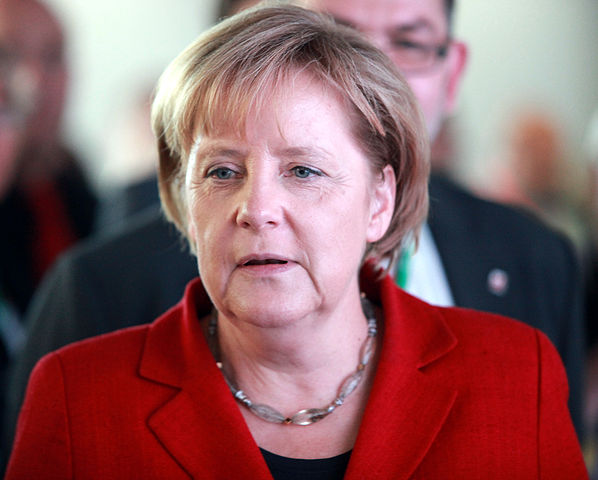
German Chancellor Angela Merkel resumed complex coalition talks Saturday in a last-ditch effort to forge a government and avert a political crisis in Europe's biggest economy.
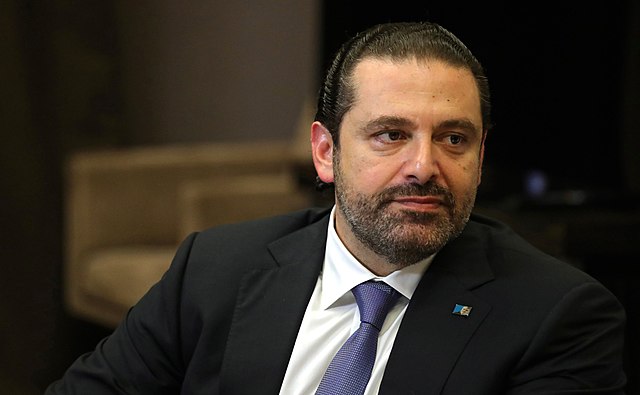
Saad Hariri pledged on Sunday he would return to Lebanon from Saudi Arabia "very soon," in his first television interview since his shock resignation as prime minister eight days ago.
In an exclusive interview from Riyadh with his party's Future TV, Hariri brushed aside rumours that he was under de facto house arrest in Saudi Arabia.
"I am free here. If I want to travel tomorrow, I will," Hariri told journalist Paula Yaacoubian.
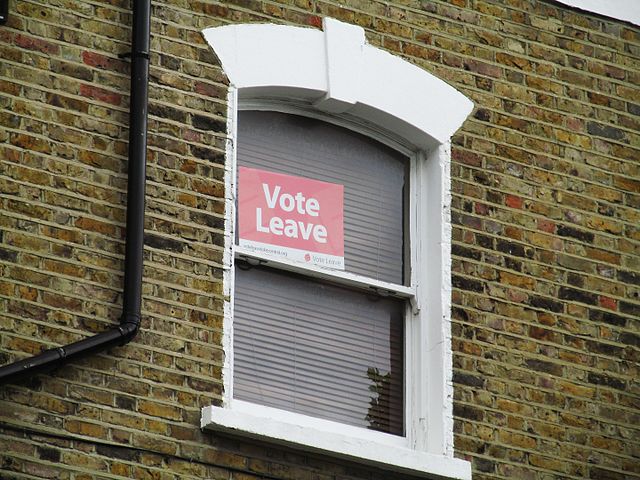
EU Brexit chief Michel Barnier on Friday handed Britain a two-week ultimatum to make concessions on a divorce agreement if it wants to unlock the next phase of talks in December.

Several Members of European Parliament have denounced the violation of human rights by Spanish judiciary in the case of Vladimir Kokorev (65), a Spanish entrepreneur of Russian-Jewish

US Commerce Secretary Wilbur Ross has defended personal business links to Russia revealed by the Paradise Papers, in an interview with the BBC on Monday.
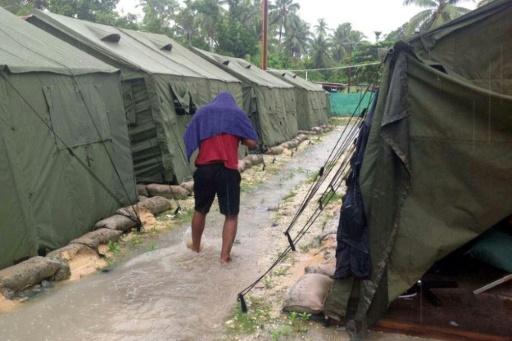
Footage from within one of Australia's offshore detention facilities for asylum seekers reached its first international audience this week in London, with one of the filmmakers highlighting the plight of his co-director who remains inside the camp.
"Chauka, Please Tell Us The Time" portrays life within Papua New Guinea's Manus Island camp, built as part of Australia's immigration crackdown which has seen asylum seekers who try to reach the country by boat taken to an offshore site.
The footage was shot on a smartphone by Behrouz Boochani, an Iranian who has spent four years in the camp since the boat he was trying to reach Australia on was intercepted by the authorities.

Personal care brand Dove has apologised for an advert that showed a black woman removing a top to reveal a white woman underneath, following accusations of racism.
The three-second video clip appeared in the United States on the social networking site Facebook.
Dove said on Twitter that it had "missed the mark in representing women of colour thoughtfully" and deeply regretted any offence caused.
The body wash ad showed a black woman removing her top, revealing a white woman underneath. She then took off her t-shirt, showing a third woman underneath.
"Ready for a Dove shower? Sulfate free with 100 percent gentle cleansers, our body wash gets top marks from dermatologists," the advert said.
The Dove brand, owned by Rotterdam-based food and consumer products giant Unilever, which is listed on the London and Amsterdam stock exchanges, apologised after several people on social media deemed the advert racist.

The case of Vladimir Kokorev, a Spanish businessmen, has moved beyond the territory of the Canary Islands and even Spain. At a roundtable event held at the European Parliament in Brussels 28 September, the Kokorev case was called a Europe-wide affair as the case now faces gross violations of law and human rights, and this takes place in a EU country. The roundtable conference was organized by MEP Fulvio Martusciello, Chair Delegation for relations with Israel.
Vladimir Kokorev (66), his wife Yulia (68) and their son Igor (35) have been kept in a Las Palmas (the Canaries, Spain) prison for two years without being lodged any charges and without any hope for fair justice. The family are charged with money laundering on behalf of Obiang Nguema, President of Equatorial Guinea, and for almost two years the family have been in custody with their case classified. It later emerged that the secrecy was required for the investigation bodies to conceal the absence of proof and evidence of Kokorevs’ guilt.
Ana Isabel de Vega Serrano, investigative judge at Las Palmas Court No 5, who issued an international arrest warrant for the Kokorevs, apparently thought that the case being classified gives her the power to keep people in prison for as long as she would want. Kokorevs’ defense lawyers who spoke up at the roundtable conference and later at the press conference deduced that the case had been masterminded by some interested parties.
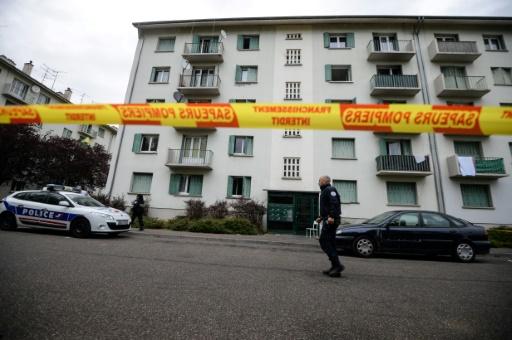
Four children and an adult were killed when a fire engulfed a social housing block in the French city of Mulhouse on Sunday night, authorities said.
Eight others were injured, three critically, in the blaze that began in the basement of a four-storey building in the northern Bourtzwiller district, the fire service said.
The fire broke out shortly before midnight.
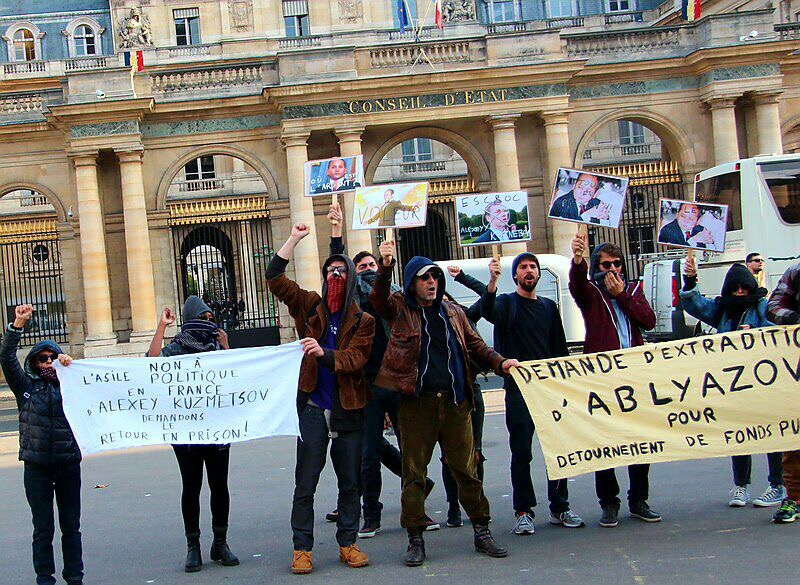
In Paris, near the building of the Council of State, a demonstration was held last week on 28 and 29 September against the policy of double standards towards international fugitives. Around 20-30 people had gathered to protest against the practice of granting asylum in France to foreign citizens accused of fraud and economic crimes on an international scale.
In particular, protesters were concerned about what they feel is a policy of double standards in France. Despite common obligations and established legal practice, some convicted criminals who are on international wanted lists and satisfy the conditions and procedures for their extradition, are nevertheless released due to politically motivated decisions and despite existing judgements by the courts and judicial authorities.
The participants at the demonstration chanted: “no to scammers”, “extradite scammers”, “extradite Kuznetsov”, “extradite Ablyazov”, “no negotiations with thieves”, “France does not participate in international crime”.
At the moment, in the territory of France, there are several controversial figures accused by a number of foreign countries of having committed economic crimes and fraud in substantial scale.


















